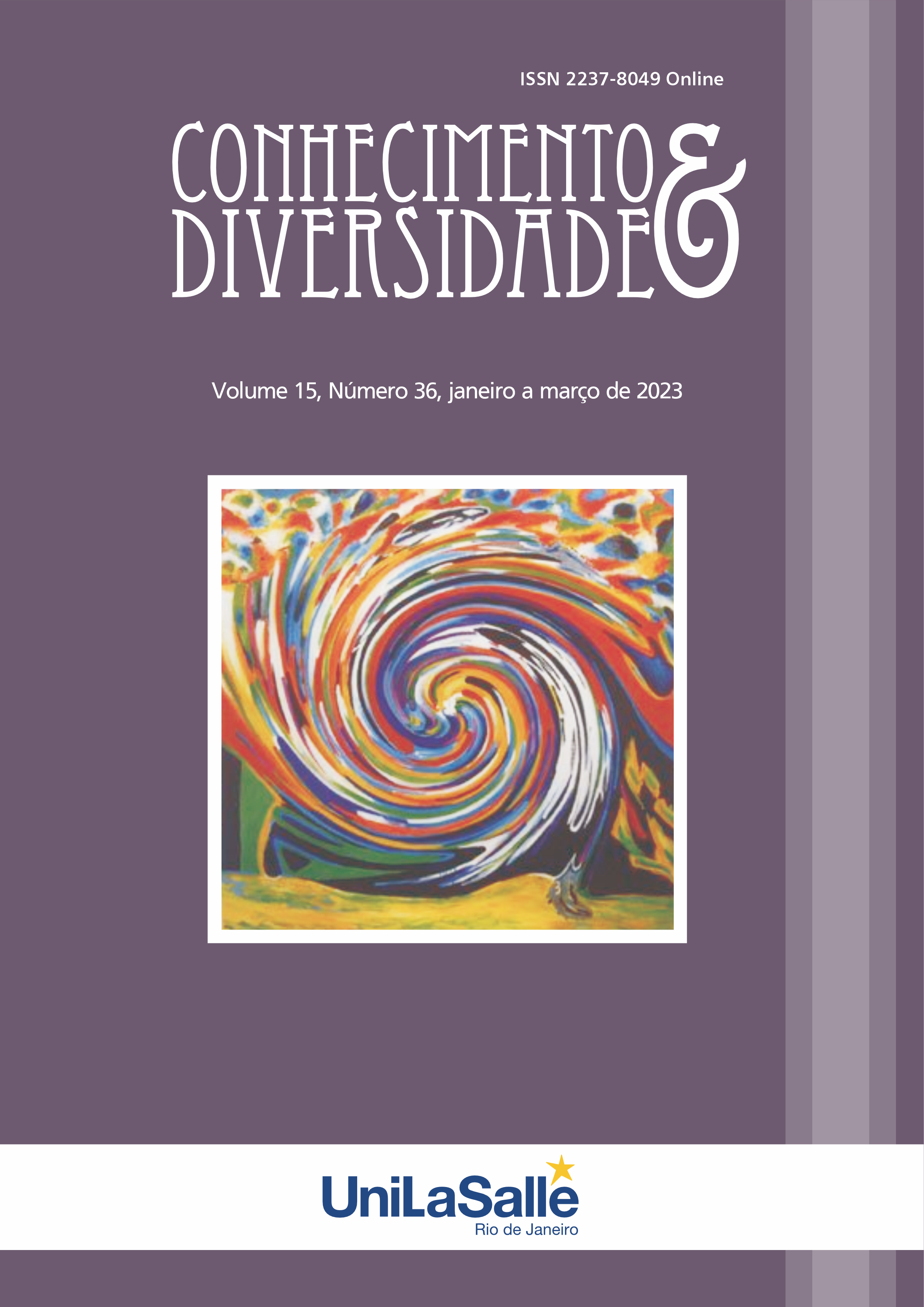A IMPORTÂNCIA E OS FATORES QUE AFETAM A ACREDITAÇÃO DA QUALIDADE DA EDUCAÇÃO PROFISSIONAL NAS FACULDADES PROFISSIONAIS
DOI:
https://doi.org/10.18316/rcd.v15i36.10984Palavras-chave:
Accreditation, vocational education, colleges, importance, impact factorsResumo
O desenvolvimento da educação e formação profissional é causa e responsabilidade de toda a sociedade, conteúdo essencial da estratégia e planeamento nacional de desenvolvimento dos recursos humanos; em que as faculdades vocacionais ocupam cargos e papéis importantes. Nos últimos anos, a rede de escolas profissionais cresceu rápida e amplamente em todo o país, a força de professores e administradores, bem como o número de estagiários que participam do treinamento profissional, cresceu tremendamente. Com este desenvolvimento, a acreditação do ensino profissional é um requisito necessário e desempenha um papel importante. Um estudo dos documentos legais do Estado, os requisitos da prática e os resultados da pesquisa sobre a acreditação da qualidade da educação profissional mostram que essa atividade desempenha um papel importante no desenvolvimento da educação profissional. Com base na pesquisa e avaliação, combinada com as regulamentações do Estado, este estudo identifica a importância e os fatores que afetam o credenciamento da qualidade do ensino profissional nas faculdades, recomendando soluções para melhorar a qualidade dessa atividade no futuro.
Referências
Bateman. A & Coles. M. (2017). Towards Quality Assurance of Technical and Vocational Education and Training. Publication of UNESCO.
Chung, M. V. (2018). Education quality accreditation and requirements for educational institutions, Education Accreditation Center - Vinh University. Vinh province.
Congress. (2006). Vocational Training Law. Hanoi: Labor - Society.
Congress. (2014), Law on Vocational Education. Hanoi: National politics.
Department for Accreditation of Vocational Education. (2019). Report on the accreditation and quality assurance of TVET in 2008 - 2019. Hanoi.
DucHiep, H., et al. (2022). The changes in education policy in the context of educational innovation in Vietnam. Revista on Line De Política E Gestão Educacional, 26(esp.1), e022043. https://doi.org/10.22633/rpge.v26iesp.1.16772
FICCI. (2017). Leapfrogging to Education 4.0: Student at the Core, FICCI-EY Future of Skills and Jobs in India Report.
Government. (2016). Resolution No. 76/NQ-CP dated September 3, 2016, at the August regular meeting. Hanoi.
Government. (2018). Decree No. 49/2018/ND-CP dated March 30, 2018, Regulations on accreditation of vocational education quality. Hanoi.
H.V. Van. (2022a). The State’s Legal Policy and Management on Civil Servants: The Current Situation and Issues Raised. International Journal of Early Childhood Special Education, 14(3). DOI: 10.9756/INT-JECSE/V14I3.688
Hong, V.V. (2022b). Management of educational activities in schools towards the approach of learners’ competency: a case study of a high school. Nuances: Estudos Sobre Educação, 32(00), e021005. https://doi.org/10.32930/nuances.v32i00.9118.
Hien, P. T. M. (2014). Institutional staff perceptions on the impact of accreditation: A study in two Vietnamese vocational training colleges. Master’s thesis.
Hien, P. T. M. (2016). Research on TVET quality assurance system of UK, Australia, and New Zealand - A research paper ordered by the Institute of Vocational Education Science for building Vietnam National Quality Assurance Framework.
IIEP. (2010a). External quality assurance: options for higher education managers, Module 1: Making basic choices for external quality assurance systems;
IIEP. (2010b). External quality assurance: Options for higher education managers, Module 4: Understanding and assessing quality;
INQAAHE. (2013). Statement on EQA. Retrieved from http://www.inqaahe.org/admin/files/assets/subsites/1/documenten/1236866920 sta tement-on-eqa.pdf;
Jibladze, E. (2016). Suspended Development: Institutional Transformation and Lack of Improvement in the Higher Education System of Post-Revolution Georgia. Dissertation, Central European University, Budapest, Hungary. www.etd.ceu.hu/2016/jibladze_elene.pdf
Khanh, D. N. (2019). Accreditation of Vocational Education - Current situation and some policy implications - General Department of Vocational Education. Hanoi.
Matei, L. & Iwinska, J. (2016). Quality Assurance in Higher Education: a Practical Handbook. Budapest, Hungary: Yehuda Elkana Center for Higher Education
MEXT. (2009). Higher Education Bureau. Quality Assurance Framework of Higher Education in Japan. https://www.mext.go.jp/en/policy/education/highered/title02/detail02/1373877.h
Ministry of Labor, War Invalids and Social Affairs. (2017). Circular No. 15/2017/TT-BLDTBXH dated June 8, 2017, stipulating criteria and standards for vocational education quality accreditation (Corrected by Decision No. 1229/ QD-BLDTBXH dated August 4, 2017). Hanoi.
Ministry of Labor, War Invalids and Social Affairs. (2017). Circular No. 28/2017/TT-BLDTBXH dated December 15, 2017, stipulates the quality assurance system of TVET institutions. Hanoi.
Ministry of Labor, War Invalids and Social Affairs. (2018). Circular No. 27/2018/TT-BLDTBXH dated December 25, 2018, stipulates the regulation on the assessment and issuance of VET quality inspector card; process, and the cycle of vocational education quality accreditation. Hanoi.
Ministry of Labor - Invalids and Social Affairs. (2018). Report on innovation and improvement of vocational education quality - Breakthrough solutions to 2020. Hanoi.
Ministry of Labor, War Invalids and Social Affairs. (2019). Circular No. 1229/QD-BLDTBXH dated August 4, 2017, on correction of Circular No. 15/2017/TT-BLDTBXH dated June 8, 2017, of the Minister of Labor, War Invalids and Social Affairs stipulating criteria and standards for vocational education quality accreditation (Circular 1229). Hanoi.
Saroyan, A. (2011). Quality assurance - Concepts and Practices. Prepared for the World Bank.
Thang, L. V. (2019). Some difficulties in self-assessment and education quality accreditation at the College of Pedagogy, Nam Dinh College of Pedagogy. Nam Dinh province.
The Central Executive Committee. (2014). Directive No. 37-CT/TW, of the Secretariat on strengthening the leadership of the Party in training highly skilled human resources. Hanoi.
Vu, V. H. (2022). Necessity and solutions for ethical education among teachers in the framework of industrial revolution 4.0. Revista on line de Política e Gestão Educacional, Araraquara, v. 26, n. 00, p. e022166, 2022. DOI: 10.22633/rpge.v26i00.17731. Disponível em: https://periodicos.fclar.unesp.br/rpge/article/view/17731.
Downloads
Publicado
Edição
Seção
Licença
Copyright (c) 2023 LongAn Dang Nguyen

Este trabalho está licenciado sob uma licença Creative Commons Attribution 4.0 International License.
Conforme recomendado pelo o Public Knowledge Project, a RCD adota para seus artigos uma licença CREATIVE COMMONS: Atribuição CC BY 4.0.
Esta licença permite que outros distribuam, remixem, adaptem e construam sobre o seu trabalho, mesmo comercialmente, desde que lhe dêem crédito pela criação original.
Esta é a licença mais adequada oferecida.
Recomendado para a máxima divulgação e uso de materiais licenciados.



